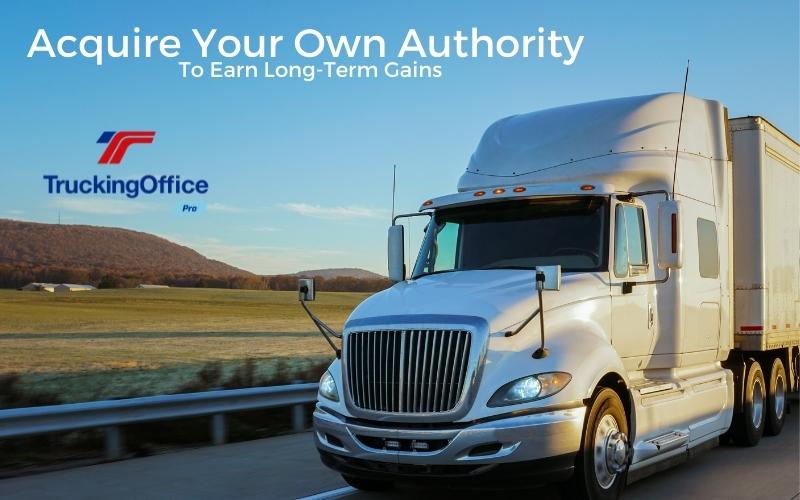
In trucking, an Authority refers to the right to operate commercial motor vehicles for transportation. This includes transporting goods or passengers for-hire.
Having this authorization is essential for legally conducting trucking operations. Operating Authority signifies compliance with regulations and ensures the safety and legitimacy of the carrier’s activities. Obtaining and maintaining this status involves meeting specific requirements set by regulatory bodies. Understanding the importance of Authority in trucking is crucial for businesses and individuals looking to operate within this industry successfully.
With the proper Authority, carriers can navigate through the complexities of the trucking sector and establish a reputable presence in the market.

Credit: www.youtube.com
Navigate As You Want:
Definition of Operating Authority: Operating Authority is a motor carrier’s right to operate a commercial motor vehicle to transport goods or passengers for-hire.
Obtaining Operating Authority: A USDOT Number is a unique interstate operating authority assigned by the Federal Motor Carrier Safety Administration (FMCSA) to all interstate movers. An MC Number is another interstate operating authority given by the FMCSA in addition to a USDOT number.
Activating Your MC Number: Owner operators have their own authority so that anyone in their business can successfully and legally transport freight. They can haul containers or any other type of freight under their authority.
Insurance Requirements: Getting Your Proof of Insurance is essential for operating authority as it ensures legal and secure transportation of goods.
Operating Authority and Truck Ownership: Having your own authority gives you a lot of opportunities to grow your trucking business, but it’s not for everyone. Running your own motor carrier takes a lot of additional skills beyond driving.
Operating authority in trucking refers to a motor carrier’s right to operate a commercial vehicle and transport goods or passengers for-hire. Having your own authority can bring valuable opportunities for growth in your trucking business, although it requires additional business skills beyond driving.
| Benefits of Having Your Own Authority |
| – Ownership and Control: Managing your own authority gives you full control over your operations. |
| – Financial Benefits: Owning authority can lead to increased profitability and financial independence. |
| – Flexibility and Independence: With your own authority, you have the freedom to make strategic decisions. |
Having your own authority as an owner operator allows you to transport freight legally and independently. Owner operators can haul various types of goods under their authority, providing flexibility and control over their business. However, owning your authority also comes with limitations and responsibilities, such as managing insurance, compliance, and operational aspects of the business. Despite the challenges, having your own authority can lead to growth opportunities and increased profitability for your trucking business.

Credit: truckstop.com
An authority in trucking is the right to operate a commercial motor vehicle for-hire. A carrier company needs authority to transport goods. This means obligations, including financial considerations. You must also consider licensing and compliance. Market conditions and competition are also important considerations. Having your own authority can offer opportunities for business growth. However, running a motor carrier requires additional business skills beyond driving.
Obtaining and managing your operating authority in trucking is a crucial process when it comes to operating a commercial motor vehicle. The application process and required documents are essential components of this process. You will need to provide necessary information and paperwork to complete the application and obtain your operating authority.
In addition, insurance and financial requirements play a significant role in managing your operating authority. It is essential to have proper insurance coverage and meet the financial responsibilities associated with operating a trucking business.
Compliance and safety regulations are another aspect of managing your operating authority. You must ensure that your operations comply with the regulations set by the relevant authorities. This includes adhering to safety protocols, maintaining and inspecting your vehicles, and ensuring driver compliance.
Record keeping and reporting are also important when it comes to managing your operating authority. Keeping accurate records of your operations, maintenance, and safety measures is crucial. Additionally, reporting requirements for various aspects of your business must be fulfilled to maintain compliance.

Credit: www.truckingoffice.com
Trucking authority permits a carrier to operate a commercial vehicle for transporting goods or passengers for-hire. It involves specific rights and regulations.
A USDOT Number and authority are not the same. A USDOT Number is an interstate operating identifier, while authority grants for-hire transport rights.
Owner operators have their own authority to transport goods, while authority is a carrier’s right to operate vehicles.
Having your own trucking authority opens growth opportunities, but requires additional business skills. It’s not suitable for all drivers.
Conclusion
Understanding the concept of operating authority in trucking is crucial for businesses in the industry. It grants the right to operate commercial vehicles for transporting goods or passengers for-hire. While it offers opportunities for growth, running a motor carrier requires additional business skills.
Thus, careful consideration is essential before pursuing operating authority.



